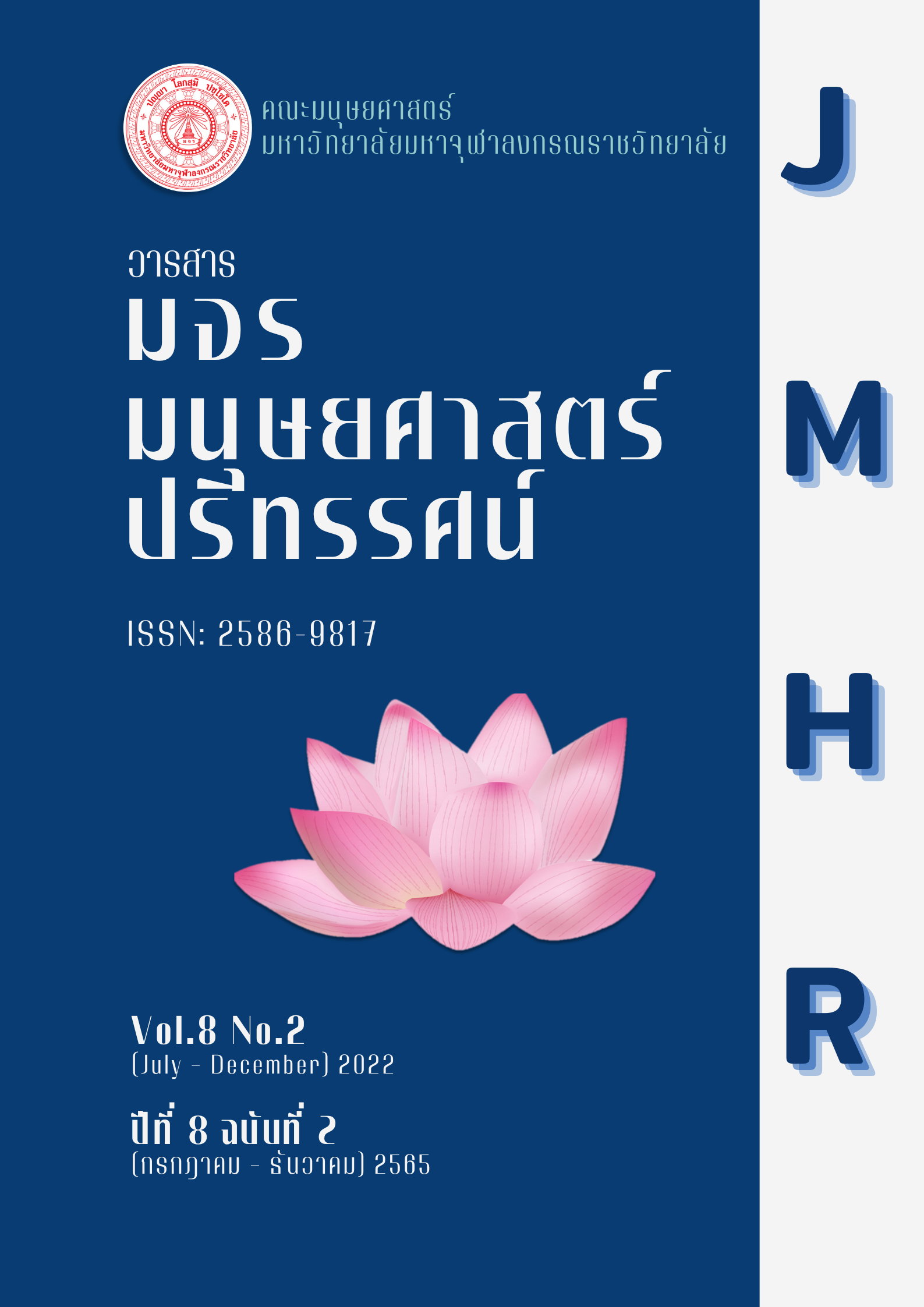ศักยภาพการจัดการตนเองของชุมชนที่มีลักษณะความเป็นเมือง สู่ชุมชนเข้มแข็ง กรณีศึกษา ชุมชนบางราวนก หมู่ที่ 7 ตำบลมหาสวัสดิ์ อำเภอบางกรวย จังหวัดนนทบุรี
คำสำคัญ:
ศักยภาพ, การจัดการตนเอง, ชุมชนเข้มแข็งบทคัดย่อ
บทความวิจัยนี้มีวัตถุประสงค์เพื่อ 1. ศึกษาทุนทางสังคมและศักยภาพของชุมชน 2. เพื่อศึกษาการจัดการตนเองของชุมชนที่มีลักษณะความเป็นเมืองสู่ชุมชนเข็มแข็ง 3. เพื่อศึกษาข้อเสนอแนะต่อการดำเนินงานส่งเสริมชุมชนจัดการตนเองสู่ชุมชนเข้มแข็ง ใช้ระเบียบวิธีการวิจัยเชิงคุณภาพ (Qualitative Study) ออกแบบการวิจัย ลักษณะการวิจัยแบบเชิงชาติวรรณนาแบบเร่งด่วน (Rapid Ethnographic Community Assessment Process) โดยการสัมภาษณ์เจาะลึกและสนทนากลุ่มกับผู้มีประสบการณ์ตรงและผู้เกี่ยวข้อง จำนวน 15 คน โดยใช้แบบสัมภาษณ์เจาะลึกและแบบสนทนากลุ่ม
ผลการวิจัย พบว่า ทุนทางสังคมของชุมชน ได้แก่ ทุนระดับบุคคล ทุนระดับกลุ่มทางสังคมและองค์กรชุมชน ทุนทางสังคมระดับทรัพยากรธรรมชาติและสิ่งแวดล้อม ทุนทางสังคมระดับหน่วยงานและเครือข่าย สำหรับศักยภาพของชุมชน คือ ผู้นำชุมชนและสมาชิกในชุมชน การมีแนวคิดการพัฒนาแบบ บวร มีจิตอาสา สร้างการเรียนรู้ให้กับประชาชนภายในชุมชนอย่างสม่ำเสมอ การจัดการตนเองของชุมชน มีลักษณะโดยใช้ความเป็นคนดั้งเดิมสร้างความคุ้นเคยสร้างปฏิสัมพันธ์กับประชาชนและประธานหมู่บ้านจัดสรร วางแผนโดยใช้ข้อมูลคือ จำนวนหมู่บ้านจัดสรรในพื้นที่ คณะกรรมการกลุ่มและแกนนำมีการประชาสัมพันธ์กิจกรรมผ่านแอปพลิเคชั่นไลน์กลุ่มผู้นำ ประสานงานผ่านนิติบุคคลของหมู่บ้านจัดสรรเพื่อนัดหมายประชาชนเข้าร่วมเวทีสร้างการเรียนรู้และสร้างความตระหนักในปัญหาของชุมชน กลไกในการดำเนินงานมีการประสานงานภาคีการพัฒนา การจัดตั้งกลุ่มธนาคารขยะประกันชีวิต การประชุมเพื่อวางแผนทำงานและจัดทำโครงการเสนอต่อหน่วยงานและสร้างคนให้จัดการตนเองตั้งแต่การพบแกนนำคนรุ่นใหม่ผ่านเวทีประชาคมโดยใช้วิธีปลุกระดมคนรุ่นใหม่ด้วยประเด็นปัญหา (ขยะ) และพัฒนาศักยภาพโดยแกนนำเดิมเป็นพี่เลี้ยงเพื่อจัดการงานและสร้างการมีส่วนร่วม ใช้วิธีดึงแกนนำกลุ่มเดิมและเปิดเวทีรับฟังความคิดเห็นเพื่อสร้างแกนนำรุ่นใหม่ สำหรับการระดมทุนและทรัพยากรต่าง ๆ ใช้วิธีพูดคุยสนทนากับทรัพยากรที่เป็นบุคคล ด้านทรัพยากรที่เป็นสถานที่ใช้พื้นที่ในวัดเป็นสถานที่สำคัญในการทำกิจกรรมและใช้ระเบียบกองทุนขยะสร้างความยั่งยืนและเสริมความเข้มแข็งให้เกิดการช่วยเหลือเกื้อกูลกันและร่วมมือระหว่างองค์กรต่างๆ พร้อมแบ่งงาน กำหนดหน้าที่และสร้างโอกาสให้กันและกัน แกนนำกลุ่มแบ่งหน้าที่รับผิดชอบลงพื้นที่สำรวจสถานการณ์และเผยแพร่ข้อมูลทำกิจกรรมของกลุ่มโดยใช้ความมีจิตอาสาในการขับเคลื่อนงาน
ข้อเสนอแนะเพื่อส่งเสริมชุมชนจัดการตนเองสู่ชุมชนเข้มแข็ง คือ ควรใช้ศักยภาพและความเป็นตัวตนของคนในชุมชนมาเป็นเครื่องมือในการทำงาน ควรวิเคราะห์ข้อมูลปัญหาความต้องการเพื่อพัฒนาสู่การวางแผน แบ่งหน้าที่ความรับผิดชอบ ผู้นำชุมชนต้องไม่หยุดพัฒนา ใช้ Social media เพื่อประสานงาน สร้างการเรียนรู้อย่างต่อเนื่องและควรใช้พลังของชุมชนตามหลักการแบบ บวร มาเป็นแนวคิดสำคัญในการพัฒนางาน
เอกสารอ้างอิง
โกวิทย์ พวงงาม. (2553). การจัดการตนเองของชุมชนและท้องถิ่น. กรุงเทพฯ : บพิธการพิมพ์.
ขนิษฐา นันทะบุตร และคณะ. (2561). การวิจัยชุมชนด้วยการวิจัยเชิงชาติพันธุ์วรรณาแบบเร่งด่วน. กรุงเทพฯ : สำนักงานกองทุนสนับสนุนการสร้างเสริมสุขภาพ.
นภาภรณ์ หะวานนท์ เพ็ญสิริ, จีระเดชากุลและสุรวุฒิ ปัดไธสง.(2550). ทฤษฎีฐานรากในเรื่องความเข้มแข็งของชุมชน. กรุงเทพฯ : สำนักงานกองทุนสนับสนุนการวิจัย.
สรรเสริญ วงศ์ชอุ่ม. (2554). การวางแผนพัฒนาประเทศ. กรุงเทพฯ : ศูนย์การพิมพ์เพชรรุ่ง.
สถาบันพัฒนาองค์กรชุมชน. (2554). ข่าวชุมชน ปฏิรูปประเทศไทย ให้ชุมชนท้องถิ่นจัดการตนเอง. กรุงเทพฯ : วิสคอมเซ็นเตอร์.
ราชกิจจานุเบกษา. (2561). ยุทธศาสตร์ชาติ พ.ศ. 2561-2580. เล่มที่ 135 ตอนที่ 82 ก : 43
สำนักงานคณะกรรมการพัฒนาเศรษฐกิจและสังคมแห่งชาติ. (2544). รายงานการศึกษาวิเคราะห์ปัจจัยทางเศรษฐกิจ สังคม และวัฒนธรรมที่สนับสนุนให้ชุมชนเข้มแข็ง. กรุงเทพฯ : สำนักงานคณะกรรมการพัฒนาเศรษฐกิจและสังคม.
“_______”. (2560). สรุปสาระสำคัญแผนพัฒนาการเศรษฐกิจและสังคมแห่งชาติ ฉบับที่ 12 พ.ศ.2560-2564. กรุงเทพฯ : สำนักงานคณะกรรมการพัฒนาเศรษฐกิจและสังคม.
สำนักงานสภาพัฒนาการเศรษฐกิจและสังคมแห่งชาติ. (2564 ). ร่างแผนพัฒนาเศรษฐกิจและสังคมแห่งชาติ ฉบับที่ 13. กรุงเทพฯ : สำนักงานสภาพัฒนาการเศรษฐกิจและสังคม.
อนุชาติ พวงสำลี และ อรทัย อาจอ่ำ. (2539). การพัฒนาเครื่องชี้วัดคุณภาพชีวิตและสังคมไทย. กรุงเทพฯ : สำนักงานกองทุนสนับสนุนการวิจัย.

ดาวน์โหลด
เผยแพร่แล้ว
รูปแบบการอ้างอิง
ฉบับ
ประเภทบทความ
หมวดหมู่
สัญญาอนุญาต
ลิขสิทธิ์ (c) 2022 วารสาร มจร มนุษยศาสตร์ปริทรรศน์

อนุญาตภายใต้เงื่อนไข Creative Commons Attribution-NonCommercial-NoDerivatives 4.0 International License.





